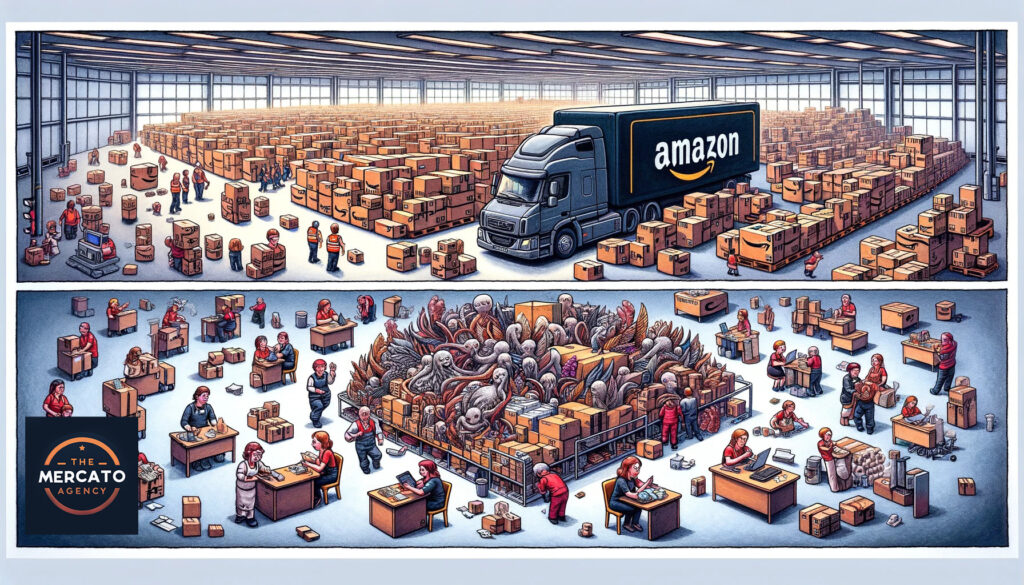Amazon FBA vs. FBM: Choosing the Right Fulfillment Strategy for Your Business
Introduction: When selling on Amazon, one of the most critical decisions you’ll make is choosing between Fulfilment by Amazon (FBA) and Fulfilment by Merchant (FBM).
Each method has its unique advantages and challenges. As an Amazon sales expert, I aim to demystify these two options, helping you decide which is the best fit for your business.
Fulfilment by Amazon (FBA): The Hands-Off Approach
FBA is a service where Amazon stores your products in its fulfillment centers.
When a customer places an order, Amazon handles the picking, packing, shipping, and customer service. This approach is akin to having a powerful logistics partner.
Advantages of FBA:
- Prime Eligibility: FBA products are automatically eligible for Amazon Prime, which can lead to higher sales, as Prime members often look for products with free and fast shipping.
- Customer Trust and Loyalty: Amazon’s world-class customer service, including handling returns, can enhance buyer trust and loyalty.
- Global Reach: FBA can be an excellent tool for sellers looking to expand internationally, offering easy access to a global audience.
- Ease of Scaling: FBA takes the burden of logistics off your shoulders, making it easier to scale your business.
Challenges of FBA:
- Costs: FBA comes with various fees, including storage fees and fulfilment fees, which can add up, especially for larger or slow-moving products.
- Inventory Management: Keeping track of inventory levels is crucial as excess stock can incur high storage fees, especially during peak seasons.
Fulfilment by Merchant (FBM): The Hands-On Approach
FBM means you handle storage, packing, shipping, and customer service. This option gives you direct control over your inventory and order fulfilment.
Advantages of FBM:
- Control Over Inventory and Shipping: FBM offers complete control over your inventory, shipping methods, and packing. This control can be crucial for products that require special handling or packaging.
- Lower Costs for Certain Products: For larger, heavier products, or items with lower turnover, FBM can be more cost-effective as it avoids the storage and fulfilment fees of FBA.
- Direct Customer Interaction: FBM allows direct interaction with customers, offering opportunities for personalized service and brand building.
Challenges of FBM:
- Time and Resource Intensive: FBM requires significant time and resources for managing inventory, fulfilment, and customer service.
- No Automatic Prime Eligibility: FBM products are not automatically Prime-eligible, which can impact sales, as Prime members tend to favour products with Prime benefits.
Which Option is Best for You?
Deciding between FBA and FBM depends on several factors:
- Product Size and Turnover: If you sell small, lightweight products with high turnover, FBA might be more cost-effective. For larger, heavier items, or products with sporadic sales, FBM could be the better choice.
- Business Scale and Resources: If you’re a small business with limited resources, FBA can relieve the burden of fulfillment. Larger businesses with established logistics might find FBM more efficient.
- Control and Branding Preferences: If having direct control over customer experience and branding is important, FBM gives you that advantage.
- International Ambitions: If you’re planning to sell globally, FBA offers an easier pathway to international markets.
- Cost-Benefit Analysis: Assess the fees associated with FBA and compare them with the potential costs and time investment required for FBM.
Conclusion:
There’s no one-size-fits-all answer when it comes to FBA vs. FBM. It’s about aligning your business model, resources, and goals with the right fulfilment strategy.
Some sellers even use a mix of both FBA and FBM, depending on their product range and sales strategy. Whichever path you choose, remember that flexibility and adaptability are key in the ever-evolving landscape of Amazon selling.
By carefully weighing the pros and cons of each option, you can select a fulfilment strategy that not only meets your current needs but also supports your long-term business growth.

